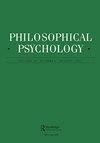(The possibility of) responsibility for delusions
IF 2.1
3区 哲学
Q2 ETHICS
引用次数: 0
Abstract
ABSTRACTIn this paper I argue that a prominent account of doxastic responsibility, Epistemic Reasons-Responsiveness can be amended to avoid two problems with its treatment of delusions. I do so by appealing to Carolina Flores’ recent work on the evidence-responsiveness of delusions: by excluding what Flores calls masking factors from the mechanism of reasons-responsiveness, we are able to accommodate the possibility for individuals with delusions to be responsible for their belief. I conclude by motivating that this possibility is one we should care about.KEYWORDS: Delusionsdoxastic responsibilityreasons-responsivenessirrationality AcknowledgementsI am indebted to two anonymous referees for their invaluable comments and challenges on two previous versions of this paper. My thanks also to Miriam Schleifer McCormick for reading and sharing her insights on an early draft. I am thankful to audiences at The Value of Irrationality workshop (University of Zurich), the Responsibility, Psychopathology & Stigma conference (University of Antwerp), and the DGPhil 7th Graduate Conference (University of Erlangen) for their feedback on earlier version of this work.Disclosure statementNo potential conflict of interest was reported by the author.Notes1. For the sake of this discussion, I take delusions to be beliefs, following Bortolotti (Citation2012) and Bayne and Pacherie (Citation2005). This view about the nature of delusions is of course debated. This assumption is justified insofar the discussion at hand is only relevant under this assumption, reasons-responsiveness being a property of beliefs and not of acceptances (Dub, Citation2017; Frankish, Citation2009, Citation2012), imaginings (Currie & Ravenscroft, Citation2002), or other entities delusions are sometimes thought to be.2. Against this classic tenet of contemporary epistemology, some philosophers defend a voluntarist position (Peels, Citation2015; Steup, Citation2017).3. McHugh (Citation2017), p. 27514. McHugh (Citation2017), p. 27515. McHugh, following Schleifer McCormick (Citation2011; Schleifer McCormick, Citation2014), Steup (Citation2008) and the original instigators of the Reasons-Responsiveness view, Fischer and Ravizza (Citation1998).6. I suspect that this worry touches on the very much debated question of epistemic agency. Briefly put, the question, “is there genuine epistemic agency?” or put differently, “do we believe for reasons in the same way we act and decide for reasons?” is a dividing and multifaceted one. Engaging with this question is beyond both the scope and the relevance of the present work. Therefore, I prefer not to stir up the hornet’s nest. Let me simply stress that this paper assumes with other scholars working on doxastic responsibility that there is epistemic agency.7. The individuation of mechanism raises, (in)famously, some thorny questions (Ginet, Citation2006; McKenna, Citation2013). They strongly parallel questions involved in what is known in epistemology as the problem of generality (Conee & Feldman, Citation1998; Goldman, Citation1979). The question at play being: are there principled criteria that delimitate what constitute one kind of mechanism (of belief formation) over another? The same question applies to cases of reasons-responsive actions, which Fischer and Ravizza discuss in the original statement of their view (Fischer & Ravizza, Citation1998, p. 39). Thus, this problem is not specific to my discussion of delusion, but a general problem for defenders of the reasons-responsiveness view of responsibility, in ethics and in epistemology, and for reliabilists, in epistemology.8. In Flores (Citation2021), p. 6312. There Flores discusses a case study investigated by (McKay & Cipolotti, Citation2007).9. “My senses were all different […] There was this feeling of being contracted, not really embodying my body, feelings of touch and being outside … maybe normally you would feel a bit of wind on your cheek … but all these things felt different. The only experience that was near it, I would say, would be being really jetlagged – up all night and then you get up and you get that sort of spongy head going on” (Freeman, Citation2018).10. McHugh (Citation2017), p. 275111. McHugh (Citation2017), p. 275112. It should be noted that Vincent’s account targets moral responsibility rather than doxastic responsibility.13. For example (my emphasis).“Dogs and cats, young children, the insane, and severely mentally retarded adults have potentially effective wills, and yet we do not regard them as responsible beings” (Wolf, Citation1990, p. 7).“[T]here are more systematic and persistent states that render a person’s normal condition one in which it would be unfair to hold the person morally accountable; here one might include, for example, insanity or mental illness, extreme youth, psychopathy, and the effects of systematic behavior control or conditioning” (Wallace, Citation1994, p. 155).“When you deliberate about whether to give 5% of your salary to the United Way and consider reasons on both sides, and your decision to give the money is not induced by hypnosis, brainwashing, direct manipulation, psychotic impulses, and so forth, we think that you can legitimately be praised for your charitable action. Insofar as we can identify no responsibility-undermining factor at work in your decision and action, we are inclined to hold you morally responsible” (Fischer & Ravizza, Citation1998, p. 36).“[W]hy does insanity exempt one from responsibility, while foolishness does not?” (Franklin, Citation2013, p. 481)Additional informationFundingThe work was supported by the Schweizerischer Nationalfonds zur Förderung der Wissenschaftlichen Forschung [P500PH_210961].(可能)对错觉负责
在本文中,我认为,一个著名的关于幻觉责任的解释,认识的原因-反应性可以修改,以避免两个问题,其治疗妄想。为此,我引用卡罗琳娜·弗洛雷斯(Carolina Flores)最近关于妄想的证据反应性的研究成果:通过排除弗洛雷斯所说的从理性反应机制中隐藏的因素,我们能够适应妄想患者为自己的信念负责的可能性。我的结论是,这种可能性是我们应该关心的。关键字:错觉、随机责任、理性、响应性、合理性感谢两位匿名审稿人对本文前两个版本的宝贵意见和质疑。我还要感谢Miriam Schleifer McCormick阅读并分享她对初稿的见解。我感谢非理性的价值研讨会(苏黎世大学),责任,精神病理学和耻辱会议(安特卫普大学)和DGPhil第七届研究生会议(埃尔兰根大学)的观众对本工作早期版本的反馈。披露声明作者未报告潜在的利益冲突。为了便于讨论,我遵循Bortolotti (Citation2012)和Bayne和Pacherie (Citation2005)的观点,将错觉视为信念。这种关于妄想本质的观点当然是有争议的。这一假设是合理的,因为目前的讨论仅在这一假设下相关,原因-响应是信念的属性,而不是接受的属性(Dub, Citation2017;Frankish, Citation2009, Citation2012),想象(Currie & Ravenscroft, Citation2002),或其他实体错觉有时被认为是。反对这一当代认识论的经典原则,一些哲学家捍卫唯意志论的立场(皮尔斯,引文2015;Steup Citation2017)。3。McHugh (Citation2017), p. 27514。McHugh (Citation2017), p. 27515。继施莱弗·麦考密克(Citation2011;Schleifer McCormick, Citation2014), Steup (Citation2008)以及原因-响应性观点的最初发起者Fischer和Ravizza (Citation1998)。我怀疑这种担忧涉及到一个非常有争议的问题,即认知代理。简单地说,这个问题是"存在真正的认知代理吗?或者换句话说,“我们的信仰是否与我们的行为和决定一样有道理?”是一个分裂和多方面的问题。研究这个问题已经超出了本研究的范围和相关性。因此,我宁愿不去捅马蜂窝。让我简单地强调一下,这篇论文与其他研究荒诞责任的学者一样,假设存在认知代理。众所周知,机制的个性化提出了一些棘手的问题(Ginet, Citation2006;麦肯纳,Citation2013)。它们与认识论中所谓的普遍性问题(Conee & Feldman, Citation1998;高盛,Citation1979)。这里的问题是:是否存在原则性的标准来界定是什么构成了一种机制(信念形成)而不是另一种机制?同样的问题也适用于Fischer和Ravizza在其观点的原始陈述中讨论的理性响应行为(Fischer & Ravizza, Citation1998, p. 39)。因此,这个问题并不是我对妄想的讨论所特有的,而是伦理学和认识论中理性-责任反应观的捍卫者以及认识论中的可靠主义者所面临的普遍问题。见《弗洛雷斯》(Citation2021),第6312页。Flores讨论了McKay & Cipolotti (Citation2007)调查的一个案例研究。“我的感觉都不一样了……有一种收缩的感觉,没有真正体现我的身体,触摸的感觉和在外面的感觉……也许通常你会感到脸颊上有一点风……但所有这些感觉都不一样。”我想说的是,唯一接近它的经历就是真正的时差——整晚都没睡,然后你起床了,你的脑袋就像海绵一样。”McHugh (Citation2017), p. 275111。McHugh (Citation2017), p. 275112。值得注意的是,文森特的描述针对的是道德责任而不是道德责任。例如(我强调)。“狗和猫、小孩、疯子和严重智障的成年人都有潜在的有效意志,但我们却不认为他们是负责任的人”(Wolf, Citation1990, p. 7)。“这里有更系统和持久的状态,使一个人的正常状态成为一种不公平的状态,在这种状态下,让一个人在道德上负责是不公平的;这里可能包括,例如,精神错乱或精神疾病,极端青年,精神病和系统行为控制或条件作用的影响”(Wallace, Citation1994,第155页)。
本文章由计算机程序翻译,如有差异,请以英文原文为准。
求助全文
约1分钟内获得全文
求助全文
来源期刊

Philosophical Psychology
Multiple-
CiteScore
2.40
自引率
14.30%
发文量
120
期刊介绍:
Philosophical Psychology is an international journal devoted to developing and strengthening the links between philosophy and the psychological sciences, both as basic sciences and as employed in applied settings, by publishing original, peer-refereed contributions to this expanding field of study and research. Published articles deal with issues that arise in the cognitive and brain sciences, and in areas of applied psychology.
 求助内容:
求助内容: 应助结果提醒方式:
应助结果提醒方式:


